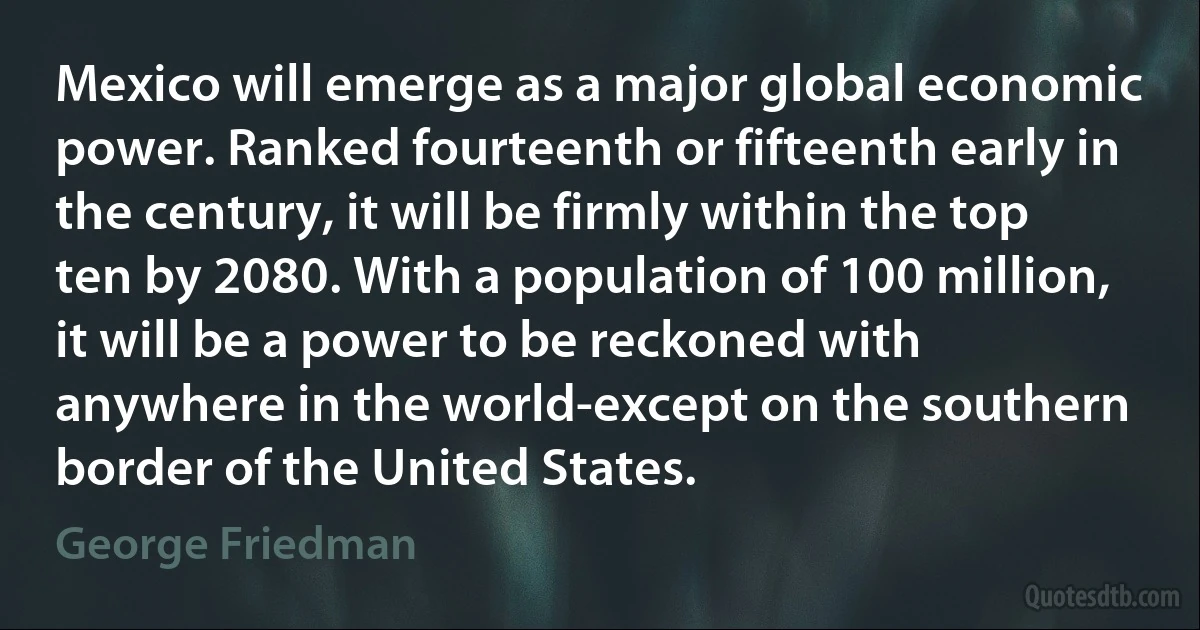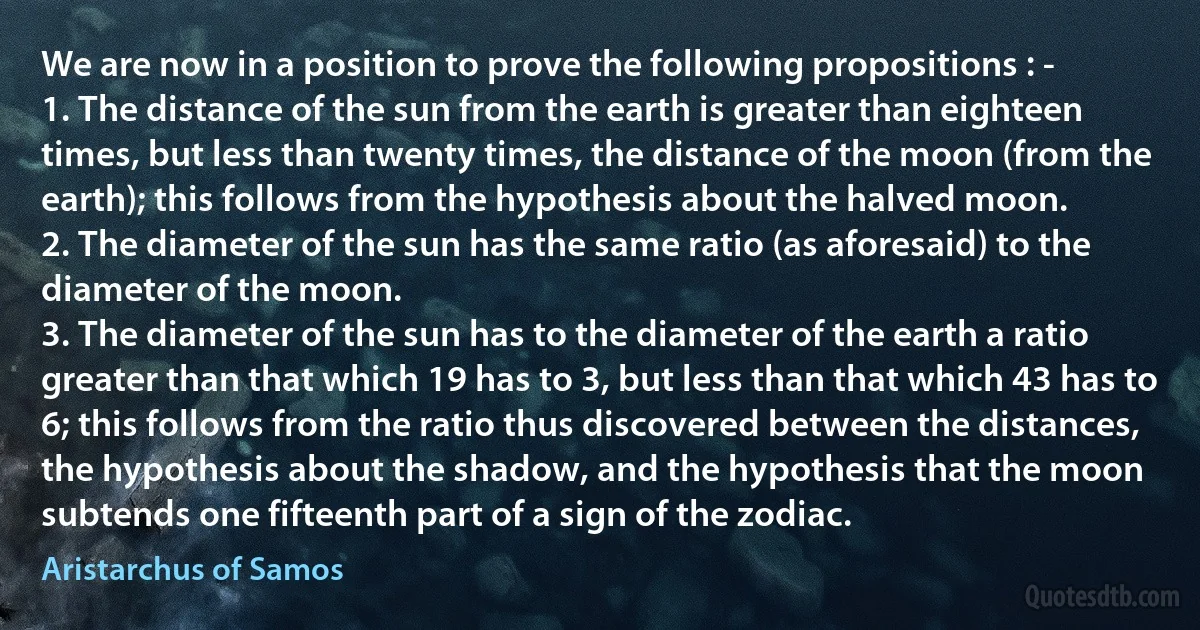Fifteenth Quotes - page 2
Very similar were the views expressed by Raymundus of Sabunde or Sabeyde, a Spaniard of the fifteenth century, and professor at Toulouse about the year 1437. In his theologia natural is, which he handled in a speculative spirit, he dealt with the Nature of things, and with the revelation of God in Nature and in the history of the God-man. He sought to prove to unbelievers the Being, the trinity, the incarnation, the life, and the revelation of God in Nature, and in the history of the God-man, basing his arguments on Reason. From the contemplation of Nature he rises to God; and in the same way he reaches morality from; observation of man's inner nature. This purer and simpler style must be set off against the other, if we are to do justice to the Scholastic theologians in their turn.

Georg Wilhelm Friedrich Hegel
In this same month ninety-five years ago-on March 30, 1870 - the Constitution of the United States was amended for the fifteenth time to guarantee that no citizen of our land should be denied the right to vote because of race or color. The command of the Fifteenth Amendment is unequivocal and its equal force upon State Governments and the Federal Government is unarguable. Section 1 of this Amendment provides: The right of citizens of the United States to vote shall not be denied or abridged by the United States or by any State on account of race, color, or previous condition of servitude.

Lyndon B. Johnson
Unless we act anew, with dispatch and resolution, we shall sanction a sad and sorrowful course for the future. For if the Fifteenth Amendment is successfully flouted today, tomorrow the First Amendment, the Fourth Amendment, the Fifth Amendment-the Sixth, the Eighth, indeed, all the provisions of the Constitution on which our system stands - will be subject to disregard and erosion. Our essential strength as a society governed by the rule of law will be crippled and corrupted and the unity of our system hollowed out and left meaningless.

Lyndon B. Johnson
Mussolini is not an ordinary socialist. You will perhaps see him one day as a leader of a consecrated battalion, saluting the flags of Italy with his sword. He is an Italian of the fifteenth century, a condottiere. He is the only man with the strength to correct the weakness of the government.

Georges Sorel
As for negative numbers... most mathematicians of the sixteenth and seventeenth centuries did not accept them... In the fifteenth century Nicolas Chuquet and, in the sixteenth, Stifel both spoke of negative numbers as absurd numbers. ...Descartes accepted them, in part. ...he had shown that, given an equation, one can obtain another whose roots are larger than the original one by any given quantity. Thus an equation with negative roots could be transformed into one with positive roots. Since we can turn false roots into real roots, Descartes was willing to accept negative numbers. Pascal regarded the subtraction of 4 from zero as utter nonsense.

Morris Kline
Meister Eckhart, the German churchman and mystic of the fourteenth century; Giovanni Pico della Mirandola in the fifteenth; Jacob Boehme, a German, in the sixteenth and seventeenth; Emanuel Swedenborg in the seventeenth and eighteenth. We are spiritually free, they said, the stewards of our own evolution. Humankind has a choice. We can awaken to our true nature. Drawing fully from our inner resources we can achieve a new dimension of mind; we can see more.

Marilyn Ferguson
In the fifteenth century Rāmachandra, in his Prakriyā-kaumudī, or "Moonlight of Method," endeavoured to make Pāṇini's grammar easier by a more practical arrangement of its matter. Bhaṭṭoji's Siddhānta-kaumudī (seventeenth century) has a similar aim; an abridgment of this work, the Laghu-kaumudī, by Varadarāja is commonly used as an introduction to the native system of grammar. Among non-Pāṇinean grammarians may be mentioned Chandra (about 600 A. D.), the pseudo-Çākaṭāyana (later than the Kāçikā), and, the most important, Hemachandra (12th century), author of a Prākrit grammar.

Pāṇini
Studying Russian history from the West European perspective, one also becomes conscious of the effect that the absence of feudalism had on Russia. Feudalism had created in the West networks of economic and political institutions that served the central state, once it replaced the feudal system, as a source of social support and relative stability. Russia knew no feudalism in the traditional sense of the word, since, after the emergence of the Muscovite monarchy in the fifteenth and sixteenth centuries, all landowners were tenants-in-chief of the Crown, and subinfeudation was unknown. As a result, all power was concentrated in the Crown.

Richard Pipes
[Hypotheses]
1. That the Moon receives its light from the sun.
2. That the earth is in the relation of a point and centre to the sphere in which the moon moves.
3. That, when the moon appears to us halved, the great circle which divides the dark and the bright portions of the moon is in the direction of our eye.
4. That, when the moon appears to us halved, its distance from the sun is then less than a quadrant by one-thirtieth of a quadrant.
5. That the breadth of the (earth's) shadow is (that) of two moons.
6. That the moon subtends one fifteenth part of a sign of the zodiac.

Aristarchus of Samos
The romantic notions of chivalry appear to have lost their vigour towards the conclusion of the fifteenth century, especially in this country, where a continued series of intestine commotions employed the exertions of every man of property, and real battles afforded but little leisure to exercise the mockery of war.

Joseph Strutt
Neil Armstrong was no Christopher Columbus. In most respects, he was better. Unlike the famous fifteenth century seafarer, Armstrong knew where he landed. He also spent his time in public service, not in jail, and his passing was marked by world-wide encomiums. He ended his days as a celebrated explorer rather than a royal inconvenience.

Seth Shostak
On my fifteenth birthday I'll run away from home, journey to a far-off town, and live in a corner of a small library. It'd take a week to go into the whole thing, all the details. So I'll just give the main point. On my fifteenth birthday I'll run away from home, journey to a far-off town, and live in a corner of a small library.

Haruki Murakami
It appears that soon after the introduction of bowling-alleys they were productive of very evil consequences; for they became not only exceedingly numerous, but were often attached to places of public resort, which rendered them the receptacles of idle and dissolute persons; and were the means of promoting a pernicious spirit of gambling among the younger and most unwary part of the community. The little room required for making these bowling-alleys was no small cause of their multiplication, particularly in great towns and cities. In the fifteenth and sixteenth centuries these nurseries of vice were universally decried, and especially such of them as were established within the city and suburbs of London, where the ill effects arising from them were most extensive.

Joseph Strutt
I repeat that the adoption of the fifteenth amendment to the Constitution completes the greatest civil change and constitutes the most important event that has occurred since the nation came into life. The change will be beneficial in proportion to the heed that is given to the urgent recommendations of Washington.

Ulysses S. Grant
Paul, in the fifteenth chapter of his Epistle to the Corinthians, gives a detailed list of several resurrection appearances. Now there is scarcely a scholar who has doubted the genuineness of 1 Corinthians, and its date is generally accepted as about 56 A.D. But the apostle writes that he had not only previously given his readers this information orally (i.e., in 49 A.D.), but had himself 'received' it, presumably from those who were apostles before him. This may take us back to 40 A.D. or to within some ten years of the crucifixion.... Paul tells us that in 56 A.D. the majority of some 500 original witnesses were still alive....

Jesus Christ
In his first annual message to Congress the same views are forcibly presented, and are again urged in his eighth message. I repeat that the adoption of the fifteenth amendment to the Constitution completes the greatest civil change and constitutes the most important event that has occurred since the nation came into life. The change will be beneficial in proportion to the heed that is given to the urgent recommendations of Washington. If these recommendations were important then, with a population of but a few millions, how much more important now, with a population of 40,000,000, and increasing in a rapid ratio.

Ulysses S. Grant



